SUPERIOR, Ariz. – The rugged patch of land known as Oak Flat sits in the Tonto National Forest. To the San Carlos Apache Tribe, the 740-acre swath of oak groves and sheer cliffs is sacred ground, a place where they have gone for centuries to hold religious ceremonies and communicate with the Creator.
"No different than Mount Sinai," said Wendsler Nosie Sr., former chairman of the San Carlos Apache.
But Oak Flat is on a path to destruction.
The land is scheduled to be transferred to Resolution Copper, a company controlled by two foreign mining giants, and turned into one of the largest copper mines in the country. The transfer was set in motion by an eleventh-hour provision slipped into a 2014 defense bill by Arizona's two Republican senators at the time.
The poverty-stricken San Carlos Apache Tribe is fighting back in court, alleging the land belongs to the tribe and holds special religious significance. But even they worry the path to victory is slim. Resolution Copper has poured $2 billion into the project and has had the U.S. government on its side.
The dispute has turned into a David-vs.-Goliath-style standoff, drawing in environmental groups and reviving centuries-old questions over land rights involving American Indians.
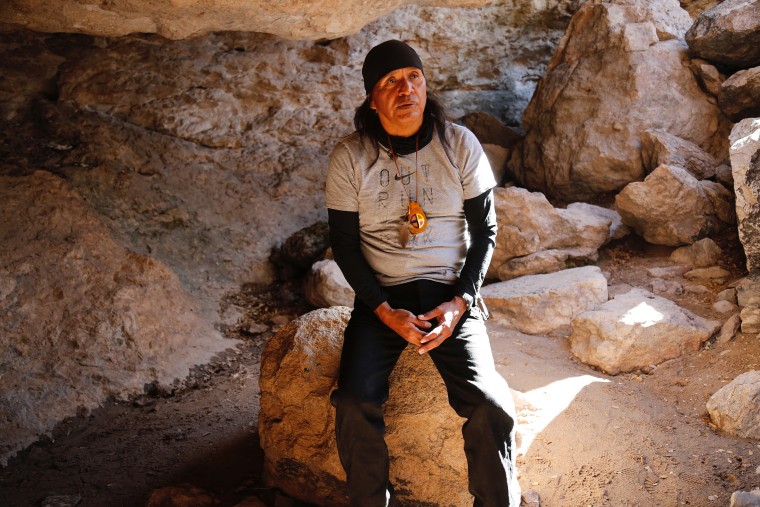
"We're still trying to defend who we are," said Nosie, who has been camped out at Oak Flat for more than a year as part of his mission to stop the mine.
He sees the conflict as the latest skirmish in his tribe's long fight to maintain its ancient way of life.
A holy place
The San Carlos Apache reservation, about 130 miles east of Phoenix, is among the poorest in the country. Four of every 5 families with children live below the federal poverty line, and the unemployment rate is 30 percent, according to a University of Arizona study.
The reservation is on the outskirts of Tonto National Forest, which is named for the Tonto band of Apaches who lived in the area until the U.S. Army cavalry forcibly removed them in the 1870s.
Many Apaches became prisoners of war. An untold number refused to surrender and instead jumped to their deaths at a ridge now known as Apache Leap.
The Oak Flat area has been considered a holy place for thousands of years, the home of spiritual beings known as Ga'an. Apaches go there to pray, to seek personal cleansing and to hold ceremonies that connect them to their ancestors. It is also a popular campground and hiking destination.
But Oak Flat has long been prized by mining companies. Beneath its surface lies a fortune — one of the largest copper deposits in the world.
Oak Flat has been protected under federal law since 1955, when President Dwight D. Eisenhower decreed the area off-limits to mining. President Richard Nixon's Interior Department renewed the ban in 1971, but it added a loophole that allowed for the area to be mined if it was traded to private interests.
A bill proposing to trade away the land had repeatedly failed to pass both houses of Congress since it was first introduced in 2005.
But in December 2014, Sens. John McCain and Jeff Flake of Arizona slipped a last-minute rider into a must-pass defense spending bill. The move amounted to a bonanza for Resolution Copper, which is jointly owned by two mining titans — the Rio Tinto Group of the U.K. and BHP Billiton Ltd. of Australia.
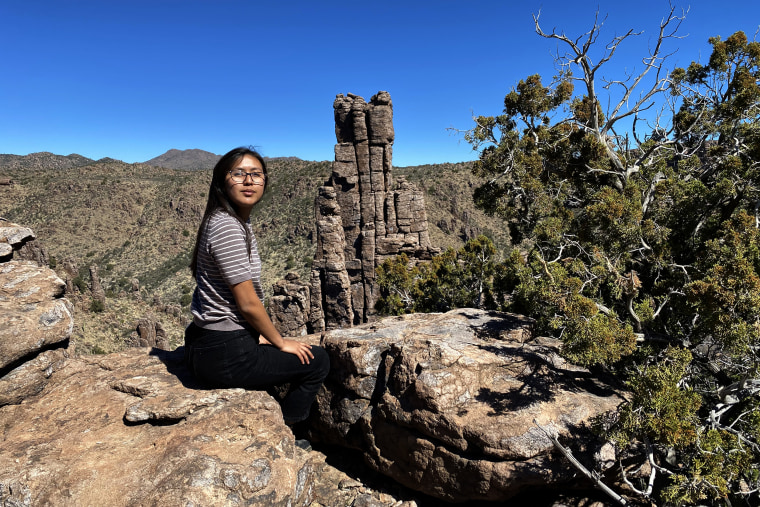
The bill transferred 2,400 acres of national forestland, including Oak Flat, to Resolution in exchange for 5,300 acres of private land owned by the mining company.
Flake declined an interview request. McCain, who died in 2018, touted the project in a 2014 op-ed in The Arizona Republic, saying that the mine would generate jobs and boost the local economy and that the land would remain open to tribal members and others until the company breaks ground.
The legislation stunned and saddened Naelyn Pike, a San Carlos Apache tribal member who first testified before Congress in opposition to the arrangement when she was 13.
"Our cultural identity is being stripped away from us," said Pike, 21, who is Nosie's granddaughter.
"No tree can live without its roots," she said. "And we're that tree."
Engineer Vicky Peacey, senior manager of permits and approvals for Resolution Cooper, said that the company is sensitive to the tribal members' concerns and that it has already modified its mining plans to leave Apache Leap and hundreds of other special areas untouched.
Peacey said company officials have set up a tribal monitoring program, with dozens of trained monitors from several tribes working alongside archaeologists to identify features of the landscape that hold special meaning. "Every plant, every animal, water feature, rocks," Peacey said. "It's really helped shape our mining plan."
Peacey emphasized that the project would employ about 1,500 people and pump about a billion dollars into the economy every year. She also said copper is critical to combating climate change.
Copper is in high demand in the U.S. and around the world, as it is an essential component in such green energy technologies as wind turbines, solar panels and electric cars. The mine beneath Oak Flat is projected to satisfy 25 percent of U.S. demand.
"We have to find a way to balance jobs, economic benefits in these rural communities, as well as environmental protection and cultural heritage preservation," Peacey said. "I think we can do it in this project."
The mining company plans to extract the copper using a method known as block caving, which over time will cause the ground to collapse and create a pit that the company acknowledges will be nearly 2 miles long and 1,000 feet deep. Oak Flat, along with its petroglyph-covered walls and Apache burial sites, is set to be swallowed up in a crater deep enough to hold the Eiffel Tower.
The project has the support of many who live in the area, including the mayor of nearby Superior.
"We need for this project to move forward," Mayor Mila Besich said, citing its economic benefits.
Besich said she didn't understand the "end game" of those opposed to the mine.
"That ore body is never going away, so let's figure out a solution," she said. "Let's figure out ways that this becomes a net positive for people, even though we are going to have to sacrifice some special places."
Others see it differently. The Arizona Mining Reform Coalition has opposed the mine in large part because of concerns over its impact on the area's water supply.
"The real Achilles' heel for this whole project is there's not enough water," said Roger Featherstone, the group's director. "That's something that has just been impossible for us to get anybody to focus on."
Legal fight
A group of Apaches and other opponents of the mine took the battle to court in January, suing the federal government to halt the land transfer.
The Apache Stronghold group argued in the suit that the planned destruction of Oak Flat would violate religious freedom protections. It also argued that an 1852 treaty between the Western Apaches and the U.S. gives the tribe rights to the site.
"The Oak Flat Parcel of the proposed Resolution Copper Mine Project is located right smack dab in the middle of the Western Apaches' 1852 Treaty lands," the lawsuit says. The treaty was "never amended, rescinded, nor terminated," it adds.
In court papers filed the day after President Joe Biden's inauguration, government lawyers argued that Apache Stronghold can't assert ownership rights to the land because the group isn't a federally recognized tribe and that even if it were, the land isn't held in trust for any tribe.
The lawyers, representing the U.S. Forest Service, also asserted that the Apaches faced no immediate harm from the land transfer and that they had failed to show a "substantial burden" on their religious exercise.
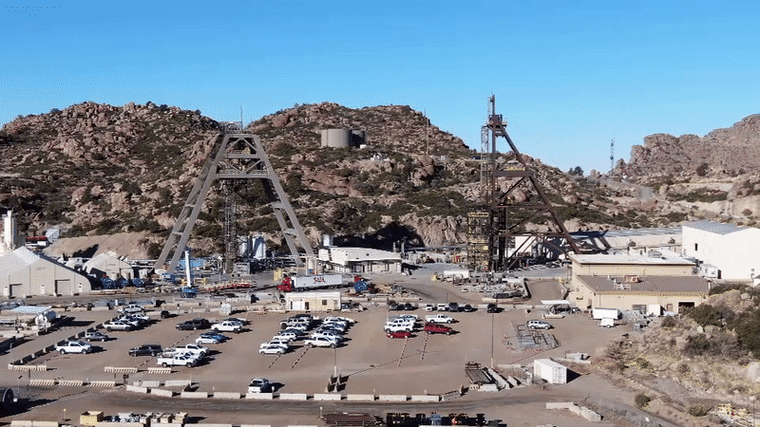
"In passing the law that created the land exchange, Congress has determined that facilitating copper mining in Arizona and expanding the Tonto National Forest—a forest which services multiple public purposes including providing recreation opportunities and habitat conservation—is in the public interest," the government lawyers wrote.
The Apaches have already suffered one legal defeat. The judge denied their emergency request to block the transfer.
U.S. District Judge Steven Logan acknowledged that the mine would "close off a portal to the Creator forever and will completely devastate the Western Apaches' lifeblood," but he said the loss didn't appear to breach religious freedom laws. He concluded that the Apache Stronghold group lacked legal standing because it represented individuals rather than a tribal government.
Apache Stronghold is appealing the decision, and the broader case continues. Two more lawsuits have been filed to block the project.
The Apaches got a rare piece of good news Monday when the Biden administration retracted an environmental impact review of the project. The review, which the Forest Service had released just five days before Biden took office, set in motion a 60-day countdown to the land transfer. The handling of the review had drawn sharp criticism as an attempt by the Trump administration to hobble future efforts to disrupt the project.
The abrupt retraction means the land transfer will no longer take place March 11. The Agriculture Department, which oversees the Forest Service, said in a statement that it wanted to conduct a thorough review of the project.
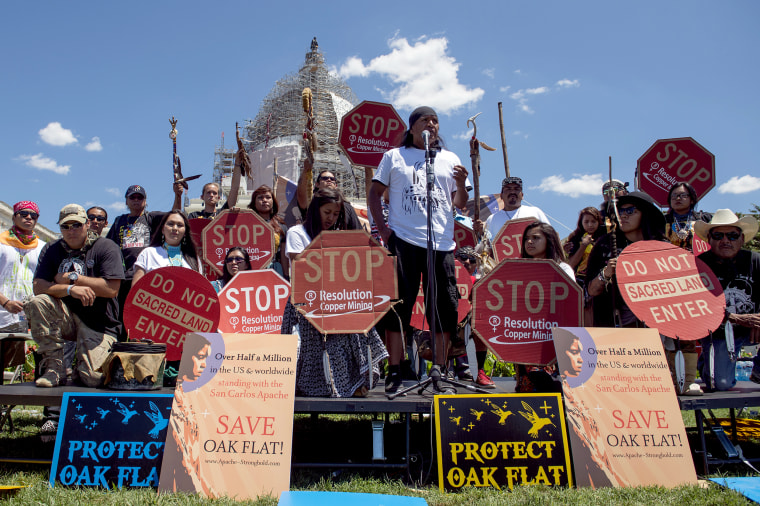
Attorneys for Apache Stronghold said the decision only delays the planned destruction. "Oak Flat is still on death row," said one of the attorneys, Michael Nixon. "This is just a postponement of the execution date."
A spokesperson said Resolution Copper is evaluating the Forest Service's decision and is committed to "ongoing consultation with Native American Tribes and local communities."
Deb Haaland, who is the first Native American to be nominated for interior secretary, said at a Senate confirmation hearing last month that the mining project was under the purview of the Forest Service but that she looked forward to being briefed about it and "making sure that the voice of the tribal nation is heard."
Rio Tinto, one of Resolution Copper's parent companies, sparked controversy last year when it destroyed caves in Australia considered sacred by Aboriginal groups. The 46,000-year-old Juukan Gorge caves were blown up in May as part of an iron ore exploration project.
The sites' destruction prompted the company to issue a public apology and spurred the resignation of its chief executive. A report prepared by Australia's Parliament concluded that Rio Tinto "knew the value of what they were destroying but blew it up anyway."
Late Tuesday, Rio Tinto announced that its chairman and a board director will step down. "I am ultimately accountable for the failings that led to this tragic event," Chairman Simon Thompson said in a statement.
Not backing down
Oak Flat's importance to the Apaches was on display in mid-February when nearly 100 tribal members gathered there for a ceremony marking the coming of age for Apache girls.
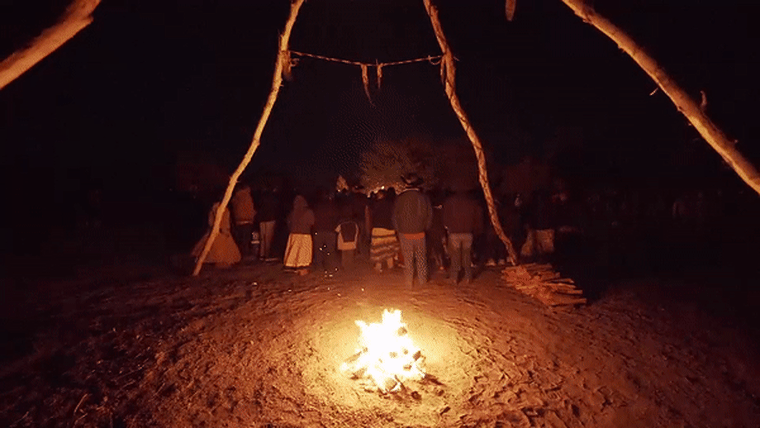
The four-day Sunrise Ceremony is a seminal event celebrating the transition from girl to woman in the Apache faith. It is a feat of endurance with several hours of dancing and praying each day.
The ceremony began in the early morning with a 12-year-old girl, dressed in a buckskin over a green camp dress and white boots, walking out to the campground and leading a procession of family members and other supporters to an open field, where they danced to 32 songs.
At dusk, a large bonfire was built using massive logs arranged in the shape of a teepee. The girl chanted, prayed and once again danced to 32 songs, surrounded by the other tribal members.
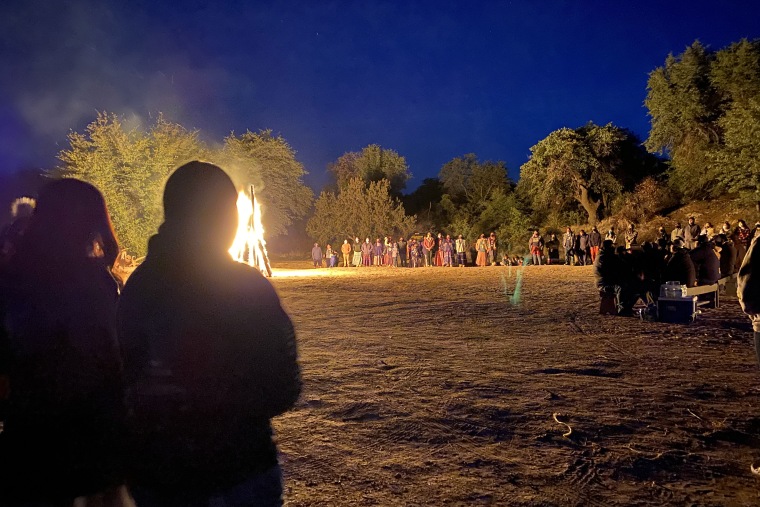
On the morning of the fourth day, the girl headed to the spiritual springs, where she washed clay off her body, signifying her rebirth as a woman.
"That ceremony paves out her life for her," said Vanessa Nosie, Wendsler Nosie's daughter. "And if it's destroyed, that main part of her life is going to be destroyed."
Wendsler Nosie, for his part, said he's willing to die to protect the land his people hold sacred.
"I'm not going anywhere," he said.


